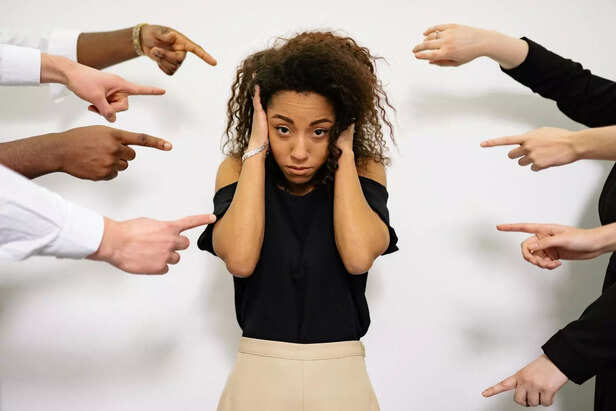‘Not All Men’ Feels Hollow When Nearly Every Woman Has a Story
Riya Kumari | Jun 13, 2025, 15:55 IST
( Image credit : Freepik )
It usually starts with a tweet. Some girl (probably exhausted, probably blocked by five “alpha males” that morning) says something painfully true—like “men make public spaces feel unsafe”—and suddenly, like hormonal clockwork, the sirens go off. The Not All Men defense squad swoops in, wielding grammar, gaslighting, and a profile pic from 2015.
“Not all men.” Three words that arrive like a full stop. Not to help. Not to heal. Just to halt. Whenever women speak about fear, or trauma, or the everyday calculations they make just to get home safely, someone inevitably shows up with this reply. And suddenly, the conversation becomes about men’s feelings instead of women’s safety. But the bigger danger? It’s not just in the defensiveness. It’s in the message those three words send to boys from a young age: "You’re not like the rest. You’re one of the good ones." And once you start believing that, it’s easy to stop paying attention to how you act, what you ignore, and who gets hurt along the way.
The Problem Isn’t That It’s False. It’s That It’s Pointless

Let’s say a woman says, “I feel unsafe walking home at night.” Responding with “Not all men are like that” doesn’t help her feel safe. It helps you feel better. It flips the conversation. Instead of focusing on her experience, it becomes about your feelings. And if that’s your first instinct? That’s worth thinking about.
Yes, not all men commit violence. That’s not a revelation—it’s a distraction. The phrase is often dropped into spaces where women are simply trying to be heard. Not accused. Not avenged. Just heard. But “Not all men” doesn’t do that. It doesn’t protect anyone. It doesn’t fix anything. It only comforts those who already felt safe. And that’s what makes it dangerous: It takes attention away from the people who need it most and hands it back to those already in power. It tells boys, “As long as you’re not actively hurting someone, you’re fine.” But silence, passivity, blind loyalty—those aren’t neutral acts. They maintain the very systems we claim to oppose.
It Teaches Boys that Being “Not the Worst” is Enough

We don’t teach boys to ask how they can help. We teach them to prove they’re not the bad ones. So instead of listening, reflecting, or stepping up—they shut down the moment they feel “accused.” Even when no one’s accusing them. That’s how we raise men who are more invested in protecting their image than protecting actual people From a young age, boys are praised for being the exception.
“You’re not like those guys.”
“You’re so respectful.”
“You’re one of the good ones.”
It feels like a compliment. But it’s really a sedative. It puts boys to sleep at the wheel of their own awareness. Because when you grow up believing you’re already good, you stop checking who you’ve become. You stop noticing when your words intimidate. When your silence enables. When your “I didn’t know” starts sounding more like “I didn’t want to know.” And if you’ve never been taught to look inward, the moment someone points something out—you panic. You deflect. You say: “Not all men.”
We’re Not Asking for Guilt. We’re Asking for Growth

Here’s what “not all men” really does: it interrupts the conversation. It tells survivors, “Tone it down.” It tells allies, “Stop generalizing.” And it tells perpetrators… nothing at all. It silences the exact voices we need to hear more from. When women speak up, they’re not looking for a villain to punish. They’re asking people to understand what it feels like to live in a world that constantly overlooks their reality. When boys hear these stories, they shouldn’t respond with guilt. Guilt is about you. They should respond with responsibility. That’s about everyone.
Tell them this:
You don’t need to prove you’re different. You need to be useful.
If You’re Not One of the Bad Ones—Prove It Matters

The truth? No one’s asking all men to apologize. We’re asking them to notice. To speak up when something feels off. To stop brushing things off as “just a joke” or “not a big deal.” The moment you say “not all men,” you’re defending a group that includes the ones who do harm. And that’s not neutral—it’s protective. Of the wrong people.
Here’s the hard truth: it’s not enough to not be the problem. The goal isn’t to walk around declaring your innocence like a badge. The goal is to be someone who makes it safer to tell the truth. To be someone who interrupts a joke, stands up in a room, listens before replying. Not because it gets you praise. But because it builds the kind of world where fewer people are afraid. Being “not all men” isn’t a moral achievement. It’s a starting point. What you do next is what counts.
The Question Every Boy Should Be Taught to Ask
Instead of raising boys to say “Not all men,” what if we raised them to ask: “What can I do to make sure it’s none?” Because that’s what this conversation is really about—not who gets blamed, but who takes ownership. Who cares enough to listen. Who’s willing to hold a mirror instead of holding a grudge.
The point isn’t to shame boys. It’s to shape them. So that one day, when they hear a woman speak her truth, they don’t rush to say they’re not the problem. They ask what they can do to help. And they mean it.
The Problem Isn’t That It’s False. It’s That It’s Pointless

Defense
( Image credit : Pexels )
Let’s say a woman says, “I feel unsafe walking home at night.” Responding with “Not all men are like that” doesn’t help her feel safe. It helps you feel better. It flips the conversation. Instead of focusing on her experience, it becomes about your feelings. And if that’s your first instinct? That’s worth thinking about.
Yes, not all men commit violence. That’s not a revelation—it’s a distraction. The phrase is often dropped into spaces where women are simply trying to be heard. Not accused. Not avenged. Just heard. But “Not all men” doesn’t do that. It doesn’t protect anyone. It doesn’t fix anything. It only comforts those who already felt safe. And that’s what makes it dangerous: It takes attention away from the people who need it most and hands it back to those already in power. It tells boys, “As long as you’re not actively hurting someone, you’re fine.” But silence, passivity, blind loyalty—those aren’t neutral acts. They maintain the very systems we claim to oppose.
It Teaches Boys that Being “Not the Worst” is Enough

Blame
( Image credit : Pexels )
We don’t teach boys to ask how they can help. We teach them to prove they’re not the bad ones. So instead of listening, reflecting, or stepping up—they shut down the moment they feel “accused.” Even when no one’s accusing them. That’s how we raise men who are more invested in protecting their image than protecting actual people From a young age, boys are praised for being the exception.
“You’re not like those guys.”
“You’re so respectful.”
“You’re one of the good ones.”
It feels like a compliment. But it’s really a sedative. It puts boys to sleep at the wheel of their own awareness. Because when you grow up believing you’re already good, you stop checking who you’ve become. You stop noticing when your words intimidate. When your silence enables. When your “I didn’t know” starts sounding more like “I didn’t want to know.” And if you’ve never been taught to look inward, the moment someone points something out—you panic. You deflect. You say: “Not all men.”
We’re Not Asking for Guilt. We’re Asking for Growth

Women
( Image credit : Pexels )
Here’s what “not all men” really does: it interrupts the conversation. It tells survivors, “Tone it down.” It tells allies, “Stop generalizing.” And it tells perpetrators… nothing at all. It silences the exact voices we need to hear more from. When women speak up, they’re not looking for a villain to punish. They’re asking people to understand what it feels like to live in a world that constantly overlooks their reality. When boys hear these stories, they shouldn’t respond with guilt. Guilt is about you. They should respond with responsibility. That’s about everyone.
Tell them this:
You don’t need to prove you’re different. You need to be useful.
- Call it out when your friends cross the line.
- Listen without getting defensive.
- Understand that someone else’s pain isn’t about you, even if it stings a little.
If You’re Not One of the Bad Ones—Prove It Matters

Silence
( Image credit : Pexels )
The truth? No one’s asking all men to apologize. We’re asking them to notice. To speak up when something feels off. To stop brushing things off as “just a joke” or “not a big deal.” The moment you say “not all men,” you’re defending a group that includes the ones who do harm. And that’s not neutral—it’s protective. Of the wrong people.
Here’s the hard truth: it’s not enough to not be the problem. The goal isn’t to walk around declaring your innocence like a badge. The goal is to be someone who makes it safer to tell the truth. To be someone who interrupts a joke, stands up in a room, listens before replying. Not because it gets you praise. But because it builds the kind of world where fewer people are afraid. Being “not all men” isn’t a moral achievement. It’s a starting point. What you do next is what counts.
The Question Every Boy Should Be Taught to Ask
The point isn’t to shame boys. It’s to shape them. So that one day, when they hear a woman speak her truth, they don’t rush to say they’re not the problem. They ask what they can do to help. And they mean it.
